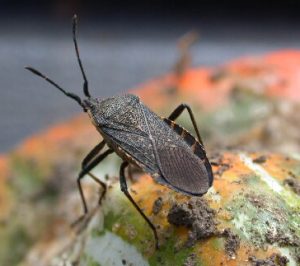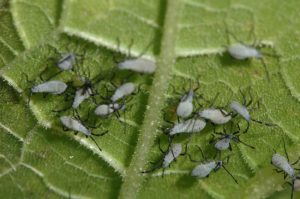Squash bug insects, also known as Anasa tristis, are pests that love to infest pumpkin and squash plants. These bugs are best controlled in the early stages as they are difficult to kill when they develop into adults and may also spread diseases. Below are organic, as well as chemical methods that can help gardeners protect their plants from the devastating impact of squash bug infestation.
Organic Methods for Squash Bug Pest Control
Organic pest control solutions refer to any method that reduces pest populations without the use of chemical insecticides. These methods are preferable to chemical alternatives since they usually pose little threat to plants, humans, or household pets. The following methods are best for reducing squash bug populations within one’s

Adult squash bug
garden.
Set up board traps near the base of plants. Set up pieces of cardboard or wood at the base of plants or in areas where organic matter can be found. Each morning, lift board to see if squash bugs can be found lurking underneath. Once any bugs are spotted, pick them up and drop them in soapy water to kill those dangerous culprits. Be prepared to act briskly though as these pests can be very quick on their legs and will make attempts to escape when you disturb their hiding place.
Use a bug blaster to spray away bugs, nymphs, and eggs. Getting rid of squash bugs isn’t as difficult as you might think once you are equipped with the right tools. This includes tools like a bug blaster, also known as a high pressure spray. Once you’ve hooked it up to your water hose, turn on the pressure and direct the spray towards the plants. The best bug blasters spray in a direction that covers 360° and are ideal for removing pests without damaging plants. Gardeners can access a high pressure spray at their local gardening center or via online stores.
Handpick bugs where squash bug populations are low. In cases where only a handful of bugs are present on your squash or pumpkin plants, consider handpicking bugs as a good alternative to chemical solutions. Wear gloves were necessary. Also place bugs in soapy water to ensure they do not escape.
Remove eggs with duct tape or a wet knife. Since squash bug eggs are tiny and attached to the underside of leaves by a glue-like residue, they can often be difficult to remove with regular DIY insecticide sprays or bug blasters. Instead, use duct tape or a wet knife. In the case of duct tape, wrap a small strip around your finger then swipe your

White bodied squash bug nymphs
finger across the underside of infested leaves. Crush the captured squash eggs between your fingers to ensure the bugs are dead. In addition, a wet knife will easily soften the sticky residue that keeps the eggs attached to leaves.
Sanitize your garden. Though this might sound like a serious spring cleaning, it simply refers to any action gardeners take to remove excess debris, organic matter or mulch from their yard or garden. This is an important method for control of squash populations as these bugs are often attracted to plant debris and mulch and will overwinter beneath these materials before emerging during spring.
What Insecticides are Best Used for an Infestation by Squash Bugs?
As with many garden pests, squash bug adults may be more resilient than you expect, resulting in an infestation that continues even when most, if not all, non-chemical methods are implemented. If you are feeling desperate for a more powerful solution and would like to try insecticides, there are a few things you will need to consider.
- What stage of the infestation is occurring within my garden? Squash bug infestation is best managed in the early stages when nymphs have not yet emerged or when nymphs are still developing. This is because nymphs and eggs respond better to pest control measures, including those that involve chemical insecticides. Look for signs of small, bronze colored eggs in clusters of about a dozen or more, as well as green colored miniature squash bugs. If you see mostly these bugs, the infestation is most likely not yet mature and therefore easier to handle.
- Which insecticides are most effective, depending on my garden’s specific infestation?
A variety of insecticides including permethrin and bifenthrin are available to help combat squash bug infestation. Contact a pest control expert to verify which type of insecticide would offer the best results for your garden.

No Comments